#shouted
Note
📓
Give me the secret Shuu thoughts, please 👀
aasdbfasdf thanks for the ask tho sync
this was connected to an old fic idea i decided to post outlines publicly of in ao3 so here goes it is under the cut.
So anyway, this is like years after the conclusion of what I've planned for that fic outline??
A TLDR summary of the fic outline: I wrote an SI fic Idea outline of Fate/Stay Night mixed with Fate/EXTRA elements because I was broken up over what happened to Charlemagne in Fate/Extella Link and it devolved from there, somewhat. And this is a story I imagined as some sequel to the first one.
Nanashi (The SI and protagonist of the fic) didn't get to stay in the FSN verse after all is over and Moon Cell is finally put back to slumber where it belongs, but she doesn't really got a place to stay anywhere... well, until Merlin showed up, summoning himself out of Avalon using the Moon Cell grail system because he is amused with Nanashi's presence and actions.
He offers to basically take Nanashi under his wing since she technically has nowhere to go and even if she stayed, but because Moon Cell is the one that isekai'ed Nanashi from her original world, an awakened Moon Cell from a different alternate reality would just easily spirit her away and get her involved in the Moon Cell Grail war and potentially erase her.
So Nanashi ended up accepting Merlin's offer since Avalon is not a place that Moon Cell can easily access or gain entry to.
After some farewell with the still alive and present Karl and Charlemagne and getting some memento's of them, Nanashi left with Merlin to Avalon.
Fast forward centuries later, Nanashi has taken a new name under Merlin's suggestion and is now capable of using magic strongly but still got more to go to be on Merlin's level since she isn't a Servant like Merlin would become in FGO.
This may have made her the new Nimue, potentially. I did not think too far yet about the implications of FGO Merlin taking in a new student.
Anyway!
Nanashi now took the name Alice Winters, her initial black hair changed to a black with purple highlights due to staying in Avalon for too long and her initially brown eyes are also changed as side effect of staying in Avalon and also due to learning everything that she knew of magic under Merlin.
Merlin would often take her to trips in alternate realities or different points of history as part of his lessons for her and also to mess with her a bit.
But one particular trip... the black carriage from Twisted Wonderland came over and brought her away.
Due to her now advanced magic and being taught a way to return to Avalon on her own, Nanashi/Alice would have left quietly after the fiasco is over... except that she can't.
The MC of this particular Twisted Wonderland is not the canonical Yuu, but Kishinami Hakuno post Fate/EXTRA. Not the one from Fate/EXTRA CCC, but the vanilla original Fate/EXTRA where their end is to be deleted by Moon Cell for going against their intended role as an NPC and stop Twice's plan.
Whenever Hakuno is active, there's a chance that Moon Cell would be involved as well, so Nanashi/Alice stayed, enrolled as a Diasomnia student and discretely watch and guide Hakuno.
Midway though, Moon Cell finally got to Hakuno and tried to take over Hakuno as a vessel for them to interact with Twisted Wonderland and Nanashi/Alice interfered and got herself possessed by Moon Cell instead to free Hakuno.
A fight later ensues with Hakuno ft. Everyone of the Twisted Wonderland cast fighting a Moon Cell possessed Nanashi/Alice.
After the Moon Cell confrontation, Nanashi/Alice eventually chose to return to Avalon with Merlin fetching her, with Hakuno and some of the Twisted Wonderland residents that Nanashi/Alice befriended with making a promise that they will find her.
...Or well, that's what I have for the idea somewhat.
There probably needs a polish or two but I half just want to write a Hakuno in Twisted Wonderland story through this with Nanashi/Alice as the pseudo mentor for Hakuno.
And yes, the fic was also inspired by elements of the Society and Foe arc from Granblue Fantasy (bricked)
7 notes
·
View notes
Text
Hey all, you know how internet searches suck now? When the results are awful, full-of-AI, death-of-the-internet levels of bad?
Start appending date constraints to your searches - "before:2023".
My results have gone from 90% AI bullshit to ~60% usable - which frankly at this point is a huge improvement.
#information death of the internet etc#legit this has been SO SO helpful#shout out to mastodon infosec server for this one#before 2022 we did not really have the AI-content-farms because. the tech did not exist to the public.#and you can knock back the date if need be#obviously this does not FIX the problem but#me.txt
77K notes
·
View notes
Text
Having your own personal blog is honestly quite a nice change of pace compared to Reddit. I could put a funny GIF of George Bush getting hit by a shoe on here and the worse case scenario is that no one even notices.
You put that on a big subreddit and you get your eyes gouged out and a heap of political discourse underneath your post.

190K notes
·
View notes
Text
This starts out as a nice gesture, then quickly becomes absolutely ridiculous.
1,024 dice. Man.
46K notes
·
View notes
Text
"You can't be a lurker on tumblr." Yes, you absolutely can. I've been quietly reblogging things since 2014 and I haven't interacted with anyone in years.
#reddit blackout#reddit migration#I realize this shout into the void is inviting that but I'm choosing to see it as taking one for the lurker team
140K notes
·
View notes
Text



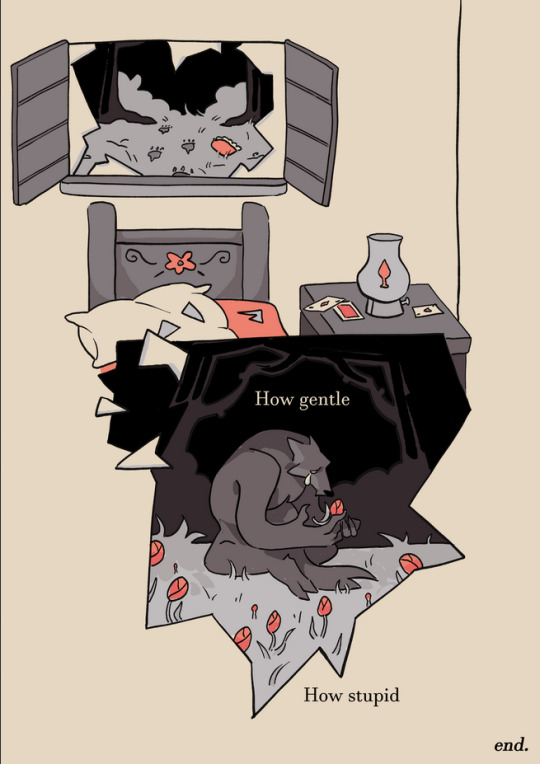
Red riding hood comic collab with the wonderful @yeehawpim (go check out their blog for loads of great comics!) 🌷
See the layouts he did here!
#james art times#artists on tumblr#comics#comics!! very excited to do this and especially with pim who is just fantastic at what they do#fairy tales#little red riding hood#pim did the layouts and I rendered these and my goodness was it a good time#he also did the image descriptions so huge shout out for that as well#go check out her comics! you will not regret it
48K notes
·
View notes
Text
having a snuggable animal in your home is like a constant minigame of ancestral persistence hunting, every morning this beast is getting yoinked from various parts of the house to indulge our daily ritual of bringing him back to bed for cuddling purposes. im like the doom guy in hell meme but instead of ronald reagan im looking for my cat
49K notes
·
View notes
Text

Man just doesn't stop fucking MURDERING white men who've done very shitty things
Edit: Yes I'm aware that Hbomb wasn't really The Guy to take down Wakefield, and Wakefield was gotten by Deere, however it was for the meme
Edit two: When referring to Shapiro I was talking about the Aquaman clip
#hbomberguy#cassie rambles#he got bencil chaperone for being FUCKING STUPID#he got andrew wakefield for being LITERALLY THE FUCKING WORST#he got tommy tallarico for being a COMPLETE FUCKING FRAUD#and now he's gotten james somerton for being a massive fucking plagiarist#AND HE'S TOPPED THE VIDEO OFF THROUGH DONATING ALL THE MONEY TO THE ACTUAL CREATORS AND SHOUTING OUT QUEER CREATORS!!!!#GODDD HBOMB YOU. YOU GODDAMN.#BIG FUCKING SHOUTOUT
26K notes
·
View notes
Text
not to be controversial bc I know this is like…not in line with shifting opinions on fanfic comment culture but if there’s a glaring typo in my work I will NOT be offended by pointing it out. if ao3 fucks up the formatting…I will also not be offended by having this pointed out…
‘looking forward to the next update’ and ‘I hope you update soon!’ are different vibes than a demand, and should be read in good faith because a reader is finding their way to tell you how much they love it. I will not be mad at this.
‘I don’t usually like this ship but this fic made me feel something’ is also incredibly high praise. I’m not going to get mad at this.
even ‘I love this fic but I’m curious about why you made [x] choice’ is just another way a reader is engaging in and putting thought into your work.
I just feel like a lot of authors take any comment that’s not perfectly articulated glowing praise in the exact manner they’re hoping to receive it in bad faith.
fic engagement has been dropping across the board over the last several years, and yes it’s frustrating but it isn’t as though I can’t see how it happens. comment anxiety can be a real thing. the last thing anyone wants to do is offend an author they love, and that means sometimes people default to silence.
idk where I’m going with this I guess aside from saying unless a comment is outright attacking me I’m never going to get mad at it, and I think a lot of authors should feel the same way. ESPECIALLY TYPOS PLZ GOD POINT OUT MY TYPOS.
#ao3#archive of our own#fanfiction#tbh even if I got a comment that said ‘I hate you I’m going to kill your family’ on chapter 75 it still means they read 75 chapters first….#it just makes me sad to see so many writers shouting into the void#and also see ppl complain openly about the specific types of comments they receive#posting screenshots on Reddit like ‘should I be mad at this’ CALM DOWN#sigh
20K notes
·
View notes
Text
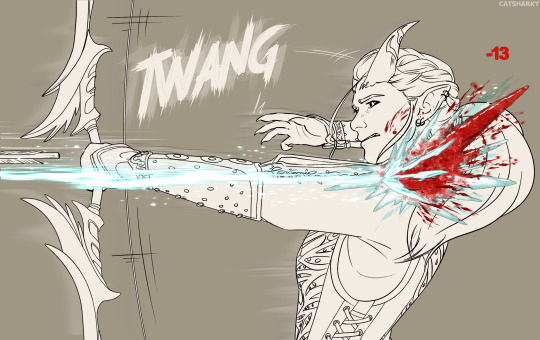





Create cool summer treats for your vampire with this one neat trick
#I had a lot of fun with those first two panels#love me some action shots#don't get to do enough of them#[shouting] violence! violence! violence!#bg3#baldur's gate 3#bg3 comic#baldur's gate 3 comic#bg3 astarion#astarion#bg3 shadowheart#shadowheart#canon typical violence#cw: blood#cw: eye trauma#my tav#sharky's tav#tav: ember#oc: ember#sharky art
14K notes
·
View notes
Note
Shuuuu tell me about our fave girl Yuu(rei) 😘 🍓 & 🍍!
ohh interesting prompts you picked there. 👀
🍓 [STRAWBERRY] How do they feel about 'cute' things?
Yuu (Rei)'s okay with them but she's more partial to "Cool" than "Cute". She'd still buy plushies of her favorite animals and Pokemon but that's about it.
Most of Yuu (Rei)'s casual attire are on the "Cool and street fashion inspired" with a handful of exceptions like formal attire and dresses.
🍍 [PINEAPPLE] Pineapple on pizza or not?
No pineapple on pizza for her. She likes her Pizza savory and if there's cheese, chewy.
1 note
·
View note
Text
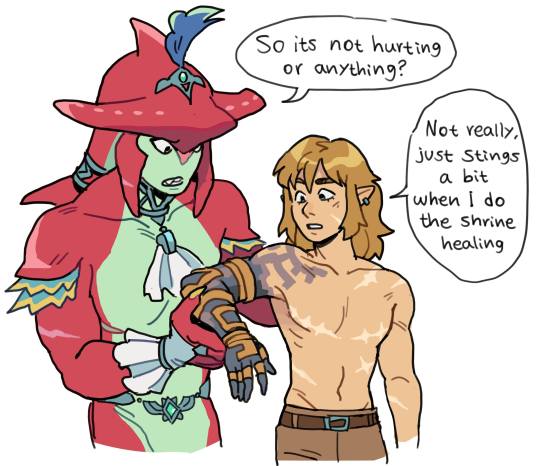
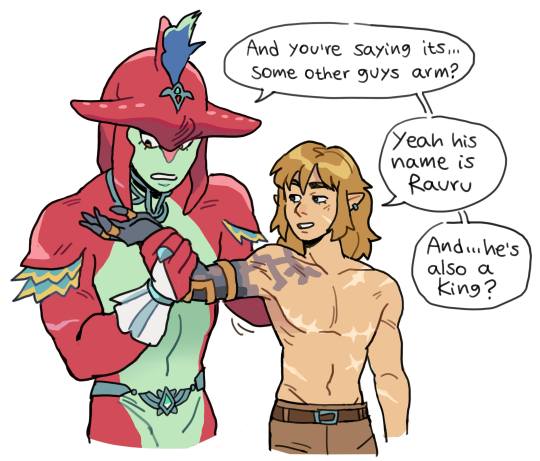
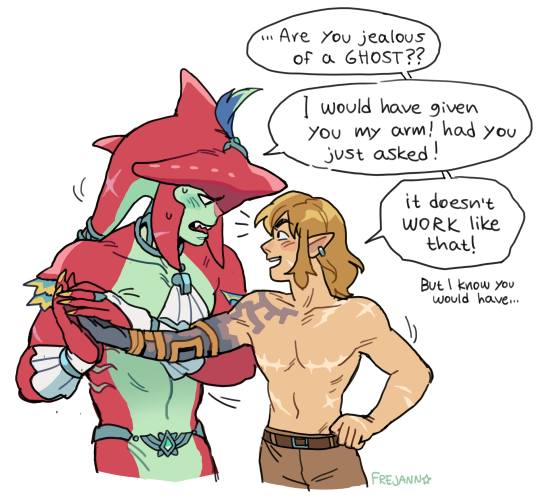
I get to draw Sidon and Link again in the year of our lord 2023
36K notes
·
View notes
Text
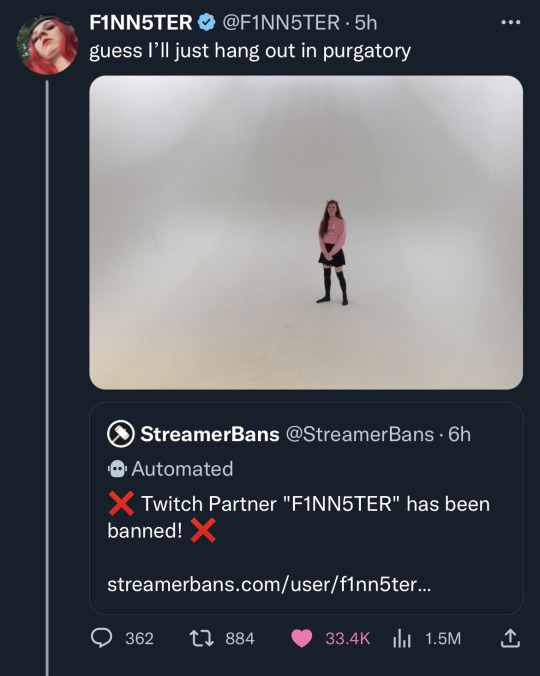

They stole our fucking boy!! He’s in the abyss now!!!!
Edit: guys he’s not banned anymore you don’t have to cry in my tags now. He’s free 🕊️
65K notes
·
View notes
Text
I don't see people gas up gnc and butch transfems nearly enough, can we get a fuckin round of applause for gnc and butch transfems
#spitblaze says things#transgender#transfem#mtf#several very good friends of mine are butch/gnc transfems and they both rule immensely#also theres just not enough appreciation for butch/gnc women generally but especially not transfem ones#not to do performative activism while having a post about not being a performative activist going around#i just wanna shout out a group that i feel is often overlooked#doin numbers
16K notes
·
View notes
Text
Direct (Quoted) and Indirect (Reported) Speech
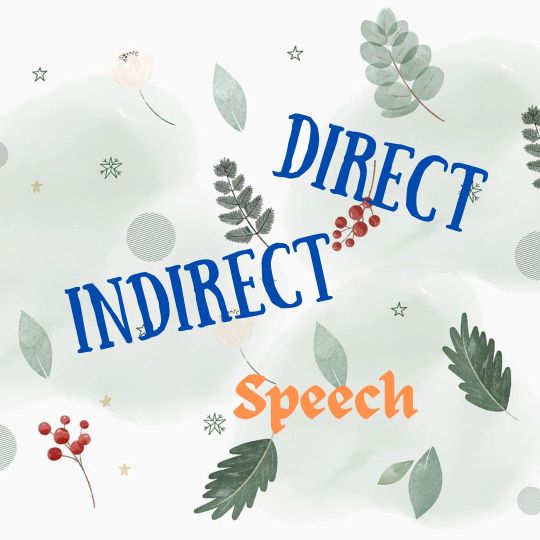
Direct and Indirect Speech��
Direct speech also known as quoted speech, is a form of reporting in which the exact words spoken by a person are enclosed in quotation marks.
Quotation Marks:
Place the spoken words inside double quotation marks (” “)
She said, “I will be there by 3 o'clock.”
Punctuation:
Use a comma, question mark, or exclamation mark to end the quoted speech, placed inside the quotation marks.
She exclaimed, “What a beautiful sunset!”
He asked, “Have you seen my keys?”
John said, “I'll meet you at the cafe at 7:00.”
Reporting Verb:
Introduce the quoted speech with a reporting verb (said, asked, replied, shouted, etc.).
The reporting verb is usually followed by a comma (,).
Mary said, “I can't believe it.”
Capitalization:
Capitalize the first letter of the quoted speech.
Tom exclaimed, “This is incredible!”
Sarah said, “I love reading books.”
The teacher asked, “Did everyone complete their homework?"
He shouted, “Run! The dog is coming!”
Lisa whispered, “I have a secret to tell you.”
“Stop right there!” commanded the police officer.
While changing the Speaker:
Start a new paragraph when there is a change in the speaker.
“I love hiking,” said Sarah.
“Really?” responded Mark. “I prefer swimming.”
Dialogue Tags:
Use dialogue tags (he said, she exclaimed, they asked) to attribute the speech to a specific character.
“I don't agree,” she argued.
Punctuation with Interrupted Speech:
Use em dashes (—) to indicate an interruption within the quoted speech.
“I was just try—”
Single Quotation Marks for Nested Quotes:
Use single quotation marks (‘’) for quotes within quotes.
She said, “He told me, ‘I'll be there.’”
Punctuation at the End of a Sentence:
If the direct speech is at the end of a sentence, place the ending punctuation inside the closing quotation mark.
“I'll see you later.”
No Punctuation for Unfinished Thoughts:
If the direct speech is an unfinished thought, use an ellipsis (…) to indicate that.
“I was just thinking that if we could...”
Reported (Indirect) Speech:
Reported speech, also known as indirect speech, is a way of expressing what someone else has said without quoting their exact words.
When using reported speech, you convey the meaning or content of someone's statement rather than reproducing their words verbatim.
Reported speech is often used to report conversations, statements, or information shared by others.
Here are the key characteristics and rules of reported speech:
Reporting Verb:
Begin the reported speech with a reporting verb such as said, told, asked, or another appropriate verb.
Direct speech – “I will come tomorrow,” Reported speech - She said (that) she would come the next day.
Pronoun Changes:
Change the pronouns in the reported speech to reflect the perspective of the speaker.
Direct speech – “I am going to the party now,” Reported speech - She said (that) she was going to the party then.
Tense Changes:
Adjust the tense of the verbs in the reported speech to reflect the time perspective of the original statement.
Direct speech – “I studied yesterday,”
Reported speech - He said (that) he had studied the day before.
Time and Place Changes:
Adjust expressions of time and place in the reported speech to match the context of the reporting.
Direct speech – “I'll meet you here the day after tomorrow,”
Reported speech - She said (that) she would meet me there two days later.
Changes in Modals:
Modify modal verbs to match the reported context.
Direct speech – “I can help you,”
Reported speech - He said (that) he could help me.
Optional “That”:
The word that is often optional in reported speech and can be omitted in many cases.
Direct speech – “I need your help,”
Reported speech - She said (that) she needed my help.
Reporting Questions:
Change questions into reported speech by using an appropriate reporting verb and adjusting word order.
Direct speech – “Are you coming with us?”
Reported speech - He asked if I was coming with them.
Reporting Commands and Requests:
Report commands and requests using verbs like ask, tell, or request, and adjust pronouns and verbs accordingly.
Direct speech – “Close the door,”
Reported speech - She told me to close the door.
Tense Shifting Rules:
When changing direct speech into indirect speech, the conjunction that is often used to introduce the reported speech.
Additionally, there are specific rules for shifting tenses depending on the tense of the original statement.
Present Simple Tense:
Direct Speech: “I like ice cream.”
Indirect Speech: She said that she liked ice cream.
Present Continuous Tense:
Direct Speech: “I am eating lunch.”
Indirect Speech: He said that he was eating lunch.
Present Perfect Tense:
Direct Speech: “I have finished my homework.”
Indirect Speech: She said that she had finished her homework.
Past Simple Tense:
Direct Speech: “I visited the museum.”
Indirect Speech: He said that he had visited the museum.
Past Continuous Tense:
Direct Speech: “I was reading a book.”
Indirect Speech: She said that she had been reading a book.
Past Perfect Tense:
Direct Speech: “I had already eaten.”
Indirect Speech: He said that he had already eaten.
No Backshift - Reporting a General Truth or Universal Fact:
Direct Speech: “The Earth revolves around the sun.”
Indirect Speech: She said that the Earth revolves around the sun.
Shifting from Tense to Tense Rule:
Present Simple to Past Simple:
Change Present Simple to Past Simple:
Direct: She said, “I get up at eight o’clock.”
Indirect: She said that she got up at eight o’clock.
Present Continuous to Past Continuous:
Change the present continuous tense to the past continuous tense.
Direct: He said, “I am watching TV.”
Indirect: He said that he was watching TV.
Present Perfect to Past Perfect:
Change the present perfect tense to the past perfect tense.
Direct: “I have visited London.”
Indirect: She said that she had visited London.
Past Simple to Past Perfect:
Change the past simple tense to the past perfect tense.
Direct: She said, “I arrived.”
Indirect: She said that she had arrived.
No Backshift for General Truths:
When reporting general truths or universal facts, there is no backshift in tense.
Direct: He says, “Water boils at 100 degrees Celsius.”
Indirect: He says that water boils at 100 degrees Celsius.
When changing direct speech to indirect speech, pronouns, demonstratives, and adverbs of time and place may need adjustment.
Here are the rules and examples for each:
Pronouns: Change of Pronouns:
Change the pronouns in the reported speech to match the perspective of the reporting speaker
Direct: “I am happy,” she said.
Indirect: She said that she was happy.
First Person to Third Person:
When reporting someone else's statement, change the first-person pronouns to third-person pronouns.
Direct: “We will be here,” he said.
Indirect: He said that they would be there.
Demonstratives: Change of Demonstratives:
Change demonstratives (this, these, that, those) to reflect the perspective of the reporting speaker.
Direct: “This is my car,” Tom said.
Indirect: Tom said (that) that was his car.
Adverbs of Time and Place: Change of Adverbs of Time:
Adjust adverbs of time to match the context of the reporting.
Direct: “I will do it tomorrow,” she said.
Indirect: She said that she would do it the next day.
Change of Adverbs of Place:
Adjust adverbs of place to match the context of the reporting.
Direct: “We met here,” he said.
Indirect: He said that they had met there.
Here's a table summarizing the changes of pronouns, demonstratives, and adverbs in reported speech:
Direct Speech
Indirect Speech
Pronouns:
I
She/he (depending on the context)
We
They
You (singular)
He/she/it
You (plural)
They
He/She/It
They
Me
Her/him
Us
Them
My/Mine
Her/his/its
Our/Ours
Their/theirs
Demonstratives:
This
That
These
Those
Adverbs of Time:
Now
Then
Today
That day
Tomorrow
The next day
Yesterday
The day before
Adverbs of Place:
Here
There
This place
That place
These places
Those places
Interrogative Sentence Transforming:
When transforming interrogative sentences from direct speech to indirect speech, there are specific rules to follow regarding word order, tense changes, and the use of reporting verbs.
Here are the rules and examples for changing interrogative sentences:
Changing Word Order: Reporting Verb and Subject Order:
Move the reporting verb and subject to the beginning of the reported question.
Direct: “Are you coming to the party?” she asked.
Indirect: She asked if I was coming to the party.
Use of If or Whether:
Introduce the reported question with if or whether.
Direct: “Will you help me?” he asked.
Indirect: He asked if/whether I would help him.
Tense Changes: Present Simple to Past Simple:
Change the present simple tense in the reported question to the past simple tense.
Direct: “Do you like coffee?” she asked.
Indirect: She asked if I liked coffee.
Present Continuous to Past Continuous:
Change the present continuous tense to the past continuous tense.
Direct: “Are you studying?” he asked.
Indirect: He asked if I was studying.
Present Perfect to Past Perfect:
Change the present perfect tense to the past perfect tense.
Direct: “Have you finished your homework?” she asked.
Indirect: She asked if I had finished my homework.
Avoiding Yes/No Questions: Using If' or Whether for Yes/No Questions:
If the direct question is a yes/no question, introduce the reported question with if or whether.
Direct: “Did you see the movie?” he asked.Indirect:
He asked if/whether I had seen the movie.
In indirect speech, yes/no questions are often transformed into statements.
Here are some examples:
Direct Speech: She asked him, “Are you interested in joining the book club?”
Indirect Speech: She asked him if he was interested in joining the book club.
He replied that he was.
He responded that he was not.
Direct Speech: She asked him, “Did you enjoy the movie last night?”
Indirect Speech: She asked if he had enjoyed the movie last night.
He said that he did.
He admitted that he did not.
Direct Speech: He asked her, “Will you be attending the conference next week?”
Indirect Speech: He asked if she would be attending the conference next week.
She confirmed that she would.
She informed him that she would not.
Direct Speech: She asked him, “Have you met the new colleague yet?”
Indirect Speech: She inquired if he had met the new colleague.
He mentioned that he had.
He stated that he had not.
Direct Speech: He asked her, “Can you lend me your notes for the meeting?”
Indirect Speech: He asked her if she could lend him her notes for the meeting.
She agreed that she could.
She apologized that she could not.
Question Words: Changing Question Words:
Change the question words (who, what, where, when, why, how) in the reported question according to the context.
Direct: “Where is the nearest store?” she asked.
Indirect: She asked where the nearest store was.
Reporting Verbs: Choosing Appropriate Reporting Verbs:
Choose reporting verbs such as ask, inquire, wonder, or want to know based on the context.
Direct: “Did you finish the report?” she asked.
Indirect: She inquired if I had finished the report.
Imperative Sentence Transforming:
When transforming imperative sentences (commands, requests, or suggestions) from direct speech to indirect speech, the structure of the sentence undergoes certain changes.
Here are the rules and examples for changing imperative sentences:
Use of a Reporting Verb:
Introduce the Reported Speech with a Reporting Verb: Use reporting verbs such as
ask, command, request, advise, suggest, etc., to introduce the indirect speech.
Direct: “Close the door,” she said.
Indirect: She asked me to close the door.
Change of Pronouns:
Adjust Pronouns Accordingly:
Adjust the pronouns in the reported speech based on the perspective of the reporting speaker.
Direct: “Bring me the book,” he said to her.
Indirect: He told her to bring him the book.
No To Before the Reported Speech:
Omit To Before the Reported Speech.
In imperative sentences, the to before the reported speech is often omitted.
Direct: “Please help me with this,” she said.
Indirect: She requested me to help her with that.
Change of Verb Forms:
Use To + Base Form of the Verb:
Change the verb form to to + base form in the reported speech.
Direct: “Stand up,” the teacher said.
Indirect: The teacher told them to stand up.
Optional That Before the Reported Speech:
Optional Use of That:
The conjunction that is optional in many cases.
With that:
“Please be quiet,” she said.
She requested that they be quiet.
Without that:
“Please be quiet,” she said.
She requested them to be quiet.
Modals in Imperative Sentences:
Use of Modals for Politeness:
Use modals like can, could, will, would, etc., for politeness.
Direct: “Pass me the salt,” he said.
Indirect: He asked if I could pass him the salt.
Reporting Verbs for Imperatives:
Appropriate Reporting Verbs:
Choose reporting verbs that convey the nature of the imperative sentence
(command, request, suggest, advise, etc.).
Direct: “Do your homework,” she said.
Indirect: She advised them to do their homework.
Exceptions:
Unchangeable Past Perfect and Past Perfect Continuous:
When transforming direct speech into indirect speech, if the reporting verb is in the past tense and the reported statement is still true or relevant at the time of reporting, the Past Perfect or Past Perfect Continuous may remain unchanged.
Direct Speech:
She said, “I had already finished the project by the time they arrived.”
Indirect Speech (Unchangeable):
She said that she had already finished the project by the time they arrived.
Direct Speech:
Mary said, “I had been working on the project for three months before I took a break.”
Indirect Speech (Unchangeable):
Mary said that she had been working on the project for three months before she took a break.
Unchangeable Past Indefinite (simple past) and Past Continuous:
When transforming direct speech into indirect speech, the use of Past Indefinite (simple past) and Past Continuous may remain unchanged if the reporting verb is in the past tense, and the time of the action is clear or specified.
Direct Speech:
John said, “I worked on the project yesterday.”
Indirect Speech (Unchangeable):
John said that he worked on the project yesterday.
Read the full article
#asked#capitalization#conversation#dorectspeech#indirectspeech#information#musttohadto#noto#optionalthat#pronounchanges#punctuation#quotationmarks#quoted#replied#reported#said#shouted#statements#tenseshifting#these-those#this-that
0 notes
Text
#i'm in love w this vid#video#the gulag#stormy shouts#it's lobsta friday btw. do not get it twisted.
77K notes
·
View notes